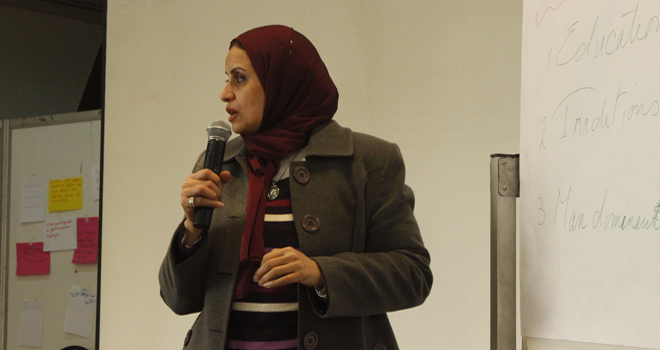With an estimated 2% of the land registered in the name of women globally, access to land for `the better half` of the world remains a challenge. Change requires shifting the mind set of women, men, communities, policy and law makers, land administrators, planners, researchers, civil society groups, traditional and religious leaders, and all those with a stake in land, as users, administrators, or providers.
Alongside with its global work, the Global Land Tool Network (GLTN) is developing context-specific tools and approaches to facilitate access to land for women. Since 2006, GLTN Partners the University of East London and UN-Habitat researched and developed capacities of key partners on Islamic land principles and pro-poor and gender sensitive land approaches for the Muslim world. The need of a set of specific tools to increase access to land for women in Muslim communities increasingly emerged as a key gap to be filled with urgency.
From 2 to 4 March 2014 a brainstorming session on priority land tools, took place in Cairo, Egypt, in preparation to the International Women Day. A very diverse group of men and women shared lessons, identified opportunities, and identified key tool development areas to be explored.
In a highly interactive fashion and using the Action Learning methodology, GLTN partners UN-Habitat, the Urban Training and Studies Institute, the University of East London, GIZ, the Union of Arab Surveyors, Habitat International Coalition, and participants from other institutions from the Muslim world deliberated and concluded that women in the Muslim world will benefit from:
1. Increased awareness on Islamic land principles and human rights (as recognized in the Universal Islamic Declaration of Human Rights and in the Universal Declaration of Human Right) that are protecting the rights to land and property for different categories of women;
2. Clarity and information on inheritance for women, including rights granted by Islamic land law and compensatory mechanisms that can complement inheritance provisions to grant access to land and property form women;
3. Information on land and property regimes that are accessible by different categories of women and their children, especially during and after marriage (e.g. marital property).
4. Mechanisms that ensure the protection of women land and property rights (and their social and economic dimension) during land processes, such as urban expansion, land subdivision and consolidation, slum upgrading, resettlement, land readjustment and others.
With the continuous support of its Partners and of the energetic brainstorming group, GLTN is now embarking on an exciting journey that will lead to increased access to land and property rights for women in the Muslim world.
To know more and engage in this process click here.
Photo: Participant Doaa El Sherif, director of Cairo’s Training and International Cooperation Urban Training and Studies Institute (UTI)














